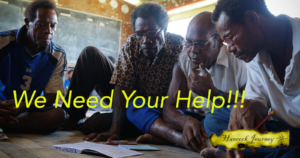
“There are pockets of Christian believers in each of these language groups,” said Bruce Smith, President and CEO of Wycliffe Associates. “Somehow, generations ago, they heard the good news, and they’ve done their best to keep the faith all this time.”
These groups live in extreme isolation, in countries too dangerous to name, and in locations that require days of travel to reach because of imposing terrain and hidden mountain passes.
“Some live in exile from oppressive regimes and we had never been able to make contact with them,” said Smith.
But recently Wycliffe Associates began hearing of the groups one by one. “By the grace of a loving God, they flickered onto our radar,” said Smith. A rare visitor ‘happened’ to make a comment, a remote radio signal crackled to life, or intrepid Christians trekked through dangerous territory, determined to make contact.”
Smith points out that the language groups are not necessarily small. Yet even in large language groups, there are very few Christians among them. Wycliffe Associates hopes to encourage the Christians in those language groups by providing them with something they have never had before: a Bible in their own language.
Through the Scriptures for New Frontiers program, Wycliffe Associates provides support to indigenous Christians who want to bring the Scriptures to their own people in their own language. The organization provides training to support locally led translation efforts, open source Bible translation technology, computer tablets loaded with Bible translation software, and digital Scripture distribution.
“Christians are extreme minorities in these countries,” said Smith. “In some of these areas authorities and traditional religious leaders are so threatened by believers that they lash out against them. Christians have to hide in order to survive. It’s hard to imagine how alone they’ve been.”
Wycliffe Associates hopes to launch 10 new Bible translation language projects as soon as possible, at a cost of $19,500 each, by providing mother-tongue Bible translators with computer tablets, software training, and a safe place to work
Of the 7,097 languages currently spoken in the world, 2,758 languages still need a Bible translation projected started.
Photo by Raul Petri on Unsplash


